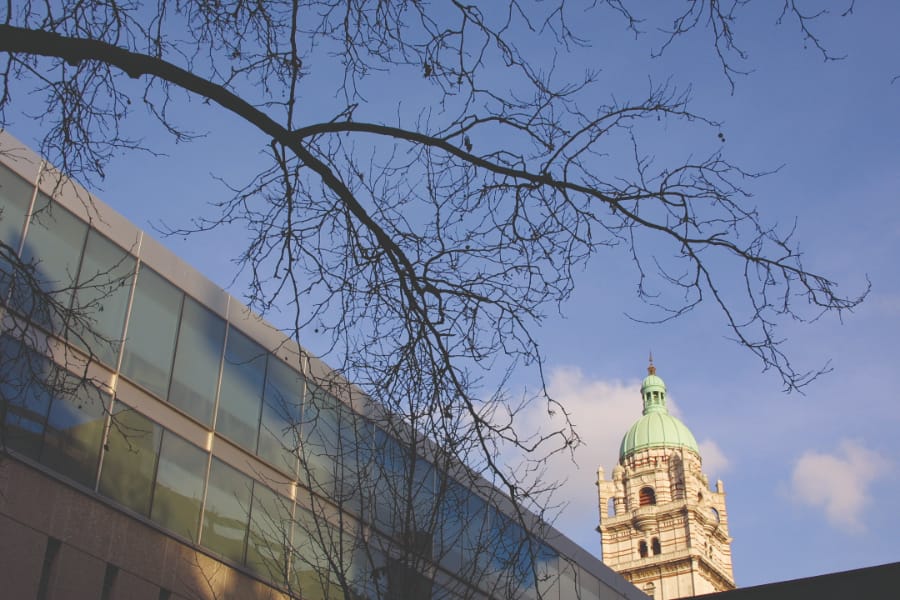Under Pressure: Counselling Service hit by increased student demand
Students accessing counselling double in five years, as wait times rise to seven weeks.

Towards the end of the last academic year, while experiencing a number of difficulties, Claire* finally picked up the courage to go and see Imperial’s Counselling Service. After waiting a few weeks for an initial assessment, she went along to the counsellor's office at her appointed time, ready to talk to someone about why she needed help. The problem she had come in with, however, turned out to be the tip of the iceberg: as the counsellor asked her questions, further issues were identified, which Claire – consciously or unconsciously – had pushed to the back of her mind. She then waited another ten weeks before accessing regular counselling sessions.
“I was disappointed,” Claire tells me, “That appointment made me feel worse, because I had to talk about my past and other deep stuff – there were all these problems I needed to work through, and then I was told to wait for two months. It just felt unfair.”
While Claire stresses how much she appreciates the support the Counselling Service has provided, she is now stuck in limbo: having used up her first four counselling sessions earlier in the year, she is now left with a limited number to ration until next year comes around. “There were a couple of times where I was feeling desperate, but then I was like ‘no, I should wait until things get bad to use the session’. But then my problems aren’t solved. I need to see a professional. Talking to friends doesn’t help.”
§
Claire was one of the 1,013 students who registered at Imperial’s Counselling Service last year, and her case is not unusual. The number accessing counselling has been increasing every year, up from 552 half a decade ago. The Counselling Service is located in a nondescript corner of the third floor of Sherfield Building, above the hustle and bustle of the main walkway; along a quiet corridor, a series of wooden doors lead into rooms where a small team help students who are in need. These calm surroundings, however, belie a service that is coming under increasing pressure each year, as more students seek out support.
The Counselling Service is run by Rosie Summerhayes, a chartered counselling psychologist who first joined Imperial in 2003. Prior to that, she had experience within the NHS and another higher education institution. Rosie is the kind of person you probably imagine when you think of the word ‘counsellor’: relaxed and softly-spoken, with a voice that is both calm and calming, she answers my questions about the state of the service with a quiet precision.
The service is divided into two branches: the Student Counselling Service, and the Student Mental Health Advice Service. Counselling can be made available for any registered student, who will have an initial meeting with a counsellor to determine what they need. Following on from this, the student will, if deemed appropriate, receive counselling. The service determines who to see first based on need, ensuring the most vulnerable students are seen the quickest; time spent on the waiting list is taken into account, to prevent those with lower-level problems being left indefinitely.
"The reality is we don't have enough counselling staff to see the number of students who are approaching us"
Students will then have access to seven counselling sessions across the year – the majority will have under four sessions, and can hold the remaining sessions in reserve for check-ins later on in the year. In their annual report, the service states: “whilst this model enables a faster turnover, we are mindful this may also impact on student satisfaction and therapeutic improvement for some students.”
Alongside this, the Student Mental Health Advice Service provides support to students with chronic conditions, who need help throughout their academic career. This service can link into other support networks, such as the Disability Advisory Service or the personal tutor system, should the student desire.
At its most basic level, the current problems with the Counselling Service can be reduced to simple economics: the supply has not increased in line with demand. While the number of students registered has increased by over 80% since 2012/13, the number of sessions on offer have only increased by 60%. The results are waiting times that have slowly been creeping up every year, and which now stand at over seven weeks between first contact and regular counselling.
These are just average times: students have anecdotally reported waiting times of up to 15 weeks, while the longest anyone waited from assessment to counselling last year was over nine months. These figures can represent the extremes – students who request specific counsellors or can only attend at certain times will need to wait longer – but the waiting time is far above the average 15 working days most universities report.
While the demand has increased, many of those I spoke to – staff and students – believe the issue is with provision. As of February 2018, the Service employs around seven full time equivalents, including Rosie, to support a student body of 18,000.
“We need more counsellors,” Rosie says, “The reality is we don’t have enough staff to see the number of students who are approaching us. Our increase has always been retrospective…it’s always been to deal with what’s already walked through the door.”
The issue is not that there aren’t skilled candidates available – the service typically has 70-150 applicants or each job – but rather the funding hasn’t been made available from the College: the service has had its budget frozen for the past two years.
While the supply side of the equation may be clear, the demand side is not. The number of students accessing the counselling service increased by roughly 80% since 2012, but the number of students at Imperial has only increased by 12.14% in the same time. There are various theories to explain the increase: a reduced stigma around seeking help; an increased atmosphere of openness within the College; an uncertain and anxious political environment; increased financial pressures associated with living in London; the rise of social media; greater demands on students to perform academically. The list goes on. In reality it is a combination of all the above driving the increase in demand.
Nevertheless, for the time being the Counselling Service is stuck in limbo. The College, which last year made nearly £120 million in surplus, are currently undertaking rounds of financial planning, after which Rosie will know how much, or how little, she will have to work with.
Professor Simone Buitendijk, Vice-Provost (Education), who is responsible for a number of aspects of the student experience, including welfare, told Felix the College were planning on increasing the support to the Counselling Service: “In the short term we are planning to increase the number of contact hours we can offer each week. In order to provide the best service we can, we will continue to prioritise those in urgent need.”
“Our investment in student counselling will be increased significantly in the next financial year. In parallel the College is working to put in place a new student support strategy which will proactively help to reduce stress. This includes tackling issues related to the academic experience which we know can exacerbate pre-existing mental health problems. It also includes initiatives to help students maintain a healthy lifestyle – both personally and academically – with the aim that we will reduce the need for counselling as a consequence.”

There is frustration among students, however, that any increases in funding are coming too late. Imperial advertises the Counselling Service within its prospectus, and, in the words of one student who has done work with recruitment, “it’s sold as part of the package of being an Imperial student.” For Claire, this lack of comprehensive support was one of the most frustrating aspects of her experience: “We pay so much, but then we don’t get anything for our fees – I’m paying around £10,000, but others can be paying £30,000. Students bring in money and a good reputation for Imperial, and then we don’t get basic things like proper mental health support.”
Shervin Sabeghi, Welfare Officer of the Royal College of Science Union (RCSU) says he has experienced more students speaking to him about external private services, as “they have no confidence that they’ll be seen quickly enough by the Counselling Service…in the very short term College should be ensuring all students who need it can access counselling in a reasonable time.”
Fintan O’Connor, the Union’s Deputy President (Welfare), told Felix: “The Counselling Service’s capacity is clearly inadequate and Imperial College Union consistently voices this fact to the College. The current level of service, resulting in average waiting times of several weeks between initial assessments and first appointments, is unacceptable. The Union is firm in the conviction that student wellbeing, in particular counselling and mental health support services, are not an optional extra, but a core requirement of any university. The Union is pleased to see that in many meetings, staff are openly making the same challenges, however we are aware we cannot become complacent.”
“Imperial report seven weeks' average waiting time”
“The Union’s role in supporting students’ welfare is one of passionate advocacy. In line with Our Strategy 2017-20, we have been lobbying the College to review the way it approaches student support, and provide a more comprehensive offering. Our objective is to work in partnership with the College to improve students’ wellbeing and amplify the student voice, and that’s exactly what we’ve been doing. The Wellbeing Representation Network has raised the profile of student welfare across the College, and allowed students to work with staff at all levels to find tangible solutions.”
How the service will interact with the move to White City is an unknown quantity – Rosie tells me she would love to have a wellbeing suite on the campus, for Counselling and other services, but that the space has to be “right: a confidential space, safe, appropriate” – as is the impact the move could have on those students who will be leaving the South Kensington campus.
The service is currently putting in place an online psychoeducation programme, called Silver Cloud, which they hope will be useful, but there is a desire to do more. “I’d love to do anxiety management”, Rosie tells me, “I'd love to do social anxiety as well, which I think is rampant, but not spoken about. I’d like to do sleep hygiene. I’d like to do a mood boost programme. I’d like to do a transitions workshop for students who are coming in, and going out. I’d like to go into departments. There are lots of things I’d like to do. But we don’t have the resources. We’ve got a waiting list. We’ve got people waiting for three months. We can’t.”
§
While it may be tempting to think of waiting times as an issue for only students, the lack of comprehensive mental health support can have a knock-on effect on staff members, particularly those who are in student-facing roles. Dr Ian Bastow and Dr Lizzie Day, senior tutor and disabilities officer respectively in the Department of Earth Science and Engineering, tell me they are spending more time speaking with students facing difficulties than they usually would; “we can’t emphasise enough how we don’t mind this as far as our own time is concerned, but we’re not mental health professionals” – they only have training in Mental Health First Aid – “and inevitably can’t even pretend to give some students the support they need.”
Anecdotally, senior and personal tutors have reported an increase in the number of students seeking advice from them and applying for mitigating circumstances. Several staff have called on the College to do more to recognise this pastoral work, embedding it in their workload models. Fintan says the Union have been working with Senior Tutors to make sure all personal tutors receive appropriate Mental Health First Aid training. This is in line with the Union’s response to the National Student Survey, which highlighted issues with student satisfaction. “More generally,” he says, “we’re working with them to ensure that students receive the support they require from pastoral care teams, in spite of the increasing demand they face.”
The knowledge that the Counselling Service isn’t meeting student needs can have an impact on those responsible for supporting students. One member of the Union’s Wellbeing Representation Network (WBRN), a new body of student volunteers responsible for signposting students to appropriate resources and feeding back wellbeing-related concerns to staff, said the current situation made her feel helpless: “Where do you send them? You get these situations where there’s nothing you can say, there’s no service we can send them to. In an ideal world the NHS would pick up the slack, but I do think the Counselling Service provisions need to be better.”
She recognises a similar effect on staff: “It’s not great [for them]…to feel they’re not doing their job”. It’s a sentiment echoed by Rosie: “When you feel like you’re not meeting the needs of people who are looking to you, that’s stressful, no matter what role you’re in.”
“The lack of support is frustrating for students”
Dr Fred Marquis, Senior Tutor of the Department of Mechanical Engineering, says: “it is frustrating to find out that when a student plucks up the courage to seek help…the waiting times are either long internally (Counselling Service) or externally (their own GP).” Furthermore, due to the transient nature of student life, a number of students will begin therapy and not complete it, as they go on holiday or move away.
Staff are also vulnerable to mental health problems. One name that repeatedly crops up in my conversations with academics on the pressures they’re facing is Stefan Grimm, a professor of toxicology at Imperial who took his own life in October 2014. An inquest later in the academic year heard how Professor Grimm was at the informal stage of the College’s management process, following difficulties in obtaining more grant money; while it is impossible to say whether or not action taken by the College would have changed the outcome, an internal review concluded there should be increased support for struggling staff members.
When I speak to Dr Martyn McLachlan, Director of Undergraduate Studies (DUGS) in the Department of Materials, he says Professor Grimm’s case brought attention to “an issue that had been going on for a long time, and possibly still continues in some places.”
“Senior tutors have reported an increase in students seeking help”
Changes may have been made on campus – Rosie tell me the idea of a work-life balance is embedded in a way it wasn’t a decade ago – but the whole landscape of higher education is changing, from the introduction of government initiatives such as the Teaching Excellence Framework, to the pension changes that triggered industrial action last term. The result is more pressure on staff – both internally and externally.
Martyn tells me about how the ever-increasing student numbers can have an impact on staff pressures: more students means more teaching, more examinations, more marking, more conversations; and the increase in taught postgraduate courses, which run over a 12-month period, mean staff are often under pressure consistently throughout the year.
He also cites the increase in data available about academics: information on how many students an academic teaches, how many PhD students they supervise, and how many papers they publish is collected by the College. While there is “no direct pressure from the institution”, he says “there’s always the thought at the back of your mind that thinks ‘well, if they have that data, and they organise it…what happens to the person who’s underperforming?’”
More generally, there is the impression that – while staff and students are doing a lot of work to address mental health problems – efforts are being hampered by poor communication. “There is a lot of good energy towards increasing student and staff support,” Rosie says, “it’s just putting it all in one place, and making sure it’s under a proper strategy.” She tells me her request to have Student Space – an advice hub for students – on the front page of Imperial’s website was denied by the College, who said it was not possible
Martyn agrees more can be done to draw links between initiatives, highlighting areas where the Department of Materials have made improvements, such as introducing a new Senior Tutor.
“There are increased pressures on staff – internally and externally”
Martyn also has experience of student support beyond his role as DUGS: he has been part of the wardening team at Imperial for a number of years, and currently lives on the top floor of Tizard Hall, in Princes Gardens. It’s a role he’s seen change over the years: while it was “always there as a welfare provision”, he now sees students presenting in need of serious extra support. “What it unclear is whether those students existed in that form before and suffered in silence, or whether there is some change that is having an impact on them.”
Anecdotally, he has seen more students applying for space in halls on account of a disability, including mental health problems. The increased awareness of mental health has been reflected in his training, but he reports reductions in overall support for wardening teams: “There may have been more resources put into the whole support network across College, [but] wardening is possibly the exception, where we’ve seen a reduction in numbers.”
§
It is important to highlight these problems with mental health are by no means unique to Imperial. Rather, it is a problem presenting across the board at universities and within this age group. Professor Buitendijk told Felix the “concerns about waiting times for the student counselling service, which have increased due to rising demand…are a challenge faced by all UK universities.”
In the past five years, the vast majority of universities have experienced a sharp increase in students seeking support, with nearly 90,000 students requesting counselling services in the UK in 2015/16. The number of students dropping out of university due to mental health problems has also trebled in recent years, with Norman Lamb, former Health Minister, describing the situation as a “crisis on campus.”
It is a problem noted at a national level: Universities UK last week released a report on mental health in higher education, which revealed nearly 60,000 students disclosed a mental health condition to their university this year, compared with under 10,000 ten years ago.

The UUK report also highlighted the number of suicides among students, which they say have been increasing steadily since 2013. In the run-up to this article I received emails from a number of staff who have been informed that three Imperial undergraduates have taken their own lives this academic year – significantly higher than would be expected for the age group or geographical area. The College told Felix their records showed only one student who had taken their own life since 2016, as judged by a coroner as part of an official inquiry. They are not able to speculate on past student deaths, or ongoing inquiries.
Why has there been this increase in mental health problems? Martyn believes there has been a change in what it is like to be a young person, and “at the point of entry students seem to come in with much more baggage than they did historically”, while others identify increased academic, financial, and social pressures.
“Students said an echo-chamber of myths drove competition”
While most people I spoke to felt Imperial had become a lot better at recognising mental health problems in the last five to ten years, the academic environment at Imperial was a contributing factor.
“I think the academic environment is a strong part of perpetuating issues people had before,” Martyn tells me, “because of this environment students perceive we have – and I don’t think it’s true, I think students conform to it – they put silly pressure on themselves. If you have mental health issues, or a predisposition to them, the chances are you’re going to accelerate that process by putting all this extra pressure on yourself.”
He tells me a story about changes made to the first year labs within the Department of Materials: a few years ago, students would have around a week to complete a comprehensive lab report, whereas now they submit a much shorter piece of work the next day. The submission is electronic, so tutors can monitor how many people are turning it in at what times: the results showed people handing in work throughout the night, up until 7am. He asked his students to raise their hand if they’d spent more than an hour on it, two hours, three hours… by the time he reached the eight hour mark most of the class still had their hands up. The individual reports contributed around 0.01% to their degree, but “because there are marks associated with it, they put so much time and effort into it, disproportionate to the magnitude of the task”.
It’s a story that calls to mind the institutional culture review carried out at Imperial, in which the words ‘competitive’, ‘ambitious’, and ‘driven’ were among the most frequently-cited descriptors of the College. The report suggested there was a lack of community spirit within the university, partly due to a lack of communal space, and that the “competitive, individualistic pursuit of research excellence often comes at the expense of other values.” Students and staff, the report argues, “felt that there was an all-consuming focus on academic performance, and negative attitudes towards those who did not do well or who were not as driven as others.”
Students we spoke to cited an echo-chamber of myths that drove competition within the College, and led to people becoming reticent to seek help. “We hand out leaflets, we email people as frequently as we can, we do surveys, and we get such a low response rate,” one member of the WBRN tells me, “it’s absolutely terrifying for me, because I know from speaking to friends that so many people are really struggling…unless you tackle this culture, almost independent of how good the services are, nobody is going to seek them out.”
“Unless you tackle the culture…nobody will speak out”
“If I wanted to send out one message, it would be that asking for help is not weak.” Helen Money-Kyrle, the Royal School of Mines Union’s (RSMU) Welfare Officer tells me, “it shows that we can be open to change, and it allows us to improve.” This inability to seek out help has been identified by many at Imperial as a major stumbling block for student support.
At the end of my conversation with Martyn, he takes me down the corridor from his office to show me the Materials Common Room – a lecture theatre the department converted into a shared space, and given back to students. The handful of students present – sitting at sofas, gathered around tables looking at laptops – sit up to attention when Martyn enters, but quickly relax back into their usual routine. “It has caused us issues with timetabling and with management,” Martyn says, “but I think the benefits are good.” The space, which encourages students from different years to spend time together, forming inter-year groups, is something of which he is clearly very proud. “To say ‘I found that difficult’ or ‘I wasn’t prepared for that’ is seen as a sign of weakness…having other people say they went through the same thing [at that stage of their degree] makes you think you’re not alone, which I think is hugely beneficial.”
§
At the end of my conversation with Rosie, after we have discussed the need the Counselling Service has for more resources, I ask her one last question: how does she feel about the future?
“I will be a lot more positive if I hear we’ve got the additional resources, and space to put that additional resource in. That we’ve got a waiting room, and there are plans to look at mental health across Imperial in a joined up, integrated way. Then I will be very positive.”
Names have been changed.
If you have been affected by anything in this article, please consider speaking to your personal tutor, senior tutor, ICU Advice Centre, or the Imperial Counselling Service. You can also phone the Samaritans (116 123) or London Nightline (02076310101) for confidential emotional support.









